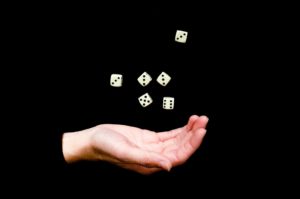“Luck plays no part in Diplomacy. Cunning and cleverness, honesty and perfectly-timed betrayal are the tools needed to outwit your fellow players. The most skillful negotiator will climb to victory over the backs of both enemies and friends.
Who do you trust?”
Avalon Hill
Every so often, I encounter challenges to the following statement from the back of the Diplomacy box:
“Luck plays no part in Diplomacy.”
The challenges go something like this: “Luck is a huge part of Diplomacy! Players are unpredictable and can deliberately throw the game. If someone has it in for you, there’s nothing you can do. Players could miss turns or quit at any time! And guessing correctly which moves to make comes down to luck.” Here are examples:
Luck PLAYS a major role in Diplomacy.
Diplomacy forum post
(a) The random nation selection can fit or not fit your interests and playing styles.
(b) The behavior and attitudes of the other six players have a major impact on the game and can be in-line with your expectations or go against them. For example: are they reliable . . . give orders each move, do not NMR out of a game if they perform poorly, play for a stalemate line if able or throw the game away. Play 15 turns to eliminate powers or just prefer to start a new game and draw this one, etc.
Not only does the random assignment of the powers count as luck (which is accurate), but also the “behavior and attitudes” of one’s rivals (such as whether they play poorly or quit). Huh?
There’s also luck in who you draw as opponents. If you pick a country with two neighbors who both come into negotiations wanting to be your ally, you’re going to have an easier time than if they both come into negotiations wanting to ally against you. Yes, if you’re good enough you can probably convince one or both of them to change their mind — but you’re in a more difficult spot than you would have been otherwise, through no action of your own; I call that luck.
Diplomacy forum post
If your rivals decide to gang up on you, that’s luck.
Quite a fun little conversation. I’m very much of the view that luck plays a massive part in diplomacy myself. How well your game goes can depend as much upon whether your neighbour has had an argument with his wife as a carefully crafted message on your part. We’ve all had games where we’ve played particularly well and got nothing, and games where we’ve done very little of significance yet ended up walking away with a solo.
Diplomacy forum post
“[L]uck plays a massive part in diplomacy” because wise plays do not necessarily result in victory, and because players might be distracted by their personal lives.
I like to say while there is no “chance” in Diplomacy, there is plenty of “luck”.
Diplomacy forum post
The removal of any random element (after power selection) from game mechanics makes Diplomacy chanceless. But luck enters in two main ways that have already been mention. Diplomacy is a game of incomplete information, so many times players have to “guess” when entering orders. Surrenders, NMR and other sub-optimal play by players does not affect all the players equally, and those that benefit more can be considered lucky.
[. . .]
Better poker players, even playing optimally, will not win every hand or every session because of random chance, but they will win more often than not over time. The same is true for better Diplomacy players. If you play closer to optimally than your opponents, you will over time be rewarded. You may not win every time due to bad luck – the surrender on the other side of the board, a series of bad guesses – but you will win more often than not.
Diplomacy involves “plenty of luck” because “luck” not only refers to random elements, but also everything the players do. The unpredictable nature of the players in Diplomacy is analogous to the randomized deck of cards in Poker.
Relative to other games you can say there is no randomness in the rules of diplomacy. However you are playing with 6 humans. Humans are unpredictable and irrational. I’d especially like to draw attention to the fact that they each have a life outside of this game that will greatly impact how they play.
Diplomacy forum post
Is it a busy time at work? Will they be available for back and forth press multiple times each phase or will they only have time to exchange 1-2 brief messages?
Are they tired when they enter their moves for a crucial phase? Misorders or missed tactics can and do happen.
Did they just play a game where they were X power and got stabbed by Y power? If they get X and you get Y in their following game you can bet they will be less likely to trust you.
Did your steadfast and brilliant ally get hit by a bus and sent to the hospital forcing NMRs?
To an extent you can try to assess and react to these factors in your press and strategy, but you can’t control them completely. You will be making a lot of decisions using intuition and even if you make the “correct” decision based on the available information it is not guaranteed to have a beneficial result each time.
You cannot control whether your rivals become sleepy, get busy at work, or “get hit by a bus.”
Luck plays a non-trivial part of standard diplomacy; if nothing else, there are plenty of times where a situation will boil down to coin flip type attack/defense positions, where it really is basically just RNG who “wins” an action
Diplomacy forum post
Gunboat multiplies that by a LOT since you’re 100% at RNG risk in spring 1901 since there’s ALWAYS a chance you’ll get ganged up on early and well that’s how it goes, and even without that, there’s much more RNG throughout the game given lack of communication and the variety of potential opponents who could have done what power X has done during the game.
Diplomacy was designed to minimize the inherent aspects of luck in a game state (and to remove anything at all that explicitly/deliberately relied on luck), and while I think they succeeded in shunting it off the side, I definitely don’t think they succeeded in eliminating it altogether.
Normally, the abbreviation “RNG” (random number generation) refers to randomly-generated information in a video game, such as how dead enemies in MMORPGs drop random items according to a loot table. Some video game players ironically use the word RNG to refer to everyday misfortunes, as though life itself is a video game with randomly-generated outcomes. This commentator, however, un-ironically uses the abbreviation RNG and the metaphor “coin flip” to describe how the players choose their moves and strategies.
There is plently of luck involved in Diplomacy, it’s just not rolling dice luck. Often you will have two set of moves, A and B, and your enemy moves C and D, in which A>(beats)C, AD. If you’re in one such situation and the other player is as good as you at lying/figuring out whos lying, then the outcome is essentially random, given by a mixed strategies nash equilibrium.
Diplomacy forum post
Think of Italy playing Ven->Pie on his first move, while France has done Mar->Spa. Italy can move on Mar or hold, France can move back to Mar or hold. Italy wins big if he moves and France holds, wins small if he holds and France moves. France wins big if he moves and Italy moves, wins big if he holds and Italy holds. All results are possible, and the diplomatic methods to figure out which move the other will do are very very limited in this situation, because there is no 3rd party immediately involved. It comes down to luck.
Predicting your rivals moves “comes down to luck.”
Each of these quotations is from a different person. I have left off their identities because my disagreement is nothing personal.
These challenges annoy me. I feel annoyed when people flatly contradict what I consider to be an obvious truth.
I say: the old Avalon Hill statement is true.
Other than her random assignment of countries at the start, Lady Luck is not a participant in Diplomacy.
The way I view the situation, the folks challenging this truth are either:
- uninformed — they aren’t aware of what English speakers are referring to when they discuss “luck” in the context of board games; or
- smartasses — they are playing a puerile word game; or
- equivocating — they conflate the concept of luck with their personal limitations.
Throughout Your Bored Brother’s adventures as a Diplomacy player, tutor, and commentator, I have encountered this conversation about twice a year. I’m tired of re-explaining my thinking each time. Fortunately, I have a blog! So I decided to write this post as something I can forward to others in the future.
1. In the Board Game Context, “Luck” Refers to Dice, Cards, Coins and Crap like That
Poker, Risk, and Backgammon have a feature that Diplomacy, Chess, and Go do not: the former games include randomized information that is generated at least once per round or turn.
When the board game community converses about the role of “luck” in a game, the community is referring to the extent that the game’s outcome depends on randomized information. Thus, it is beyond dispute that luck plays a major role in games like Poker (randomized card drawing), Axis & Allies (rolling cupfuls of dice), Settlers of Catan (again, dice), and Magic: the Gathering (again, randomized cards). By contrast, your typical member of the board game community would be perplexed by the statement “Go involves a lot of luck” because Go has no randomized features.
Luck plays a role in Diplomacy; the countries are randomly assigned as the match starts. But that role is trivial compared to these other luck-heavy games I’ve mentioned.
In Poker, the cards are shuffled and re-dealt each hand (a moderate degree of luck). In Risk and Axis & Allies, the players roll the dice dozens or even hundreds of times per turn. With thousands of dice rolls per match, the element of luck in Risk and Axis & Allies typically overwhelms the rest of the gameplay (these games are still fun!). Casino games like Craps and Roulette are games of pure luck because there’s nothing whatsoever the player can do to affect the outcome (I suppose these games are fun for some people…).

The purpose of a luck-based mechanic is to add a random element to the game—”random” in the sense that the information generated in a random process cannot be completely predicted and is not within the control of any player. No-luck games like Chess and Go lack any element of randomization (excepting, of course, the decision of who takes which side—the same role luck plays in Diplomacy).
Thus, the difference between luck-based or luck-heavy games and no-luck games is self-evident: in games of luck, you roll dice, flip coins, spin wheels, draw lots, etc. and in no-luck games… you don’t.
I cannot recall or imagine a human being incapable of perceiving that there is a difference between the games that include these randomization mechanics and the games that do not. Thus, if you and I disagree about the role of luck in Diplomacy, I suspect that our disagreement is over the meaning of the word “luck.” As applied to a board game, I am certain that the meaning of “luck” is limited to processes that randomize information. Maybe you think “luck” means something more expansive than that?
2. We’re Playing Board Games, Not Word Games
It defies a common sense use of the English language to say that luck plays “a major role” in Diplomacy. English speakers, especially ones who have played a board game, understand “luck” to refer to the rules and components of the game (such as cards, coins, dice, and other randomly generated information). Diplomacy has none of these things, and that’s why the game involves no luck.
If “luck” encompasses all possible things that could happen in the universe outside of a player’s control (e.g., players becoming incapacitated or dying during a match)…

…then every thing under the sun depends on “luck” and it’s a misleading statement to point out that Diplomacy in particular is somehow based on this understanding of “luck.”
I am well aware that English speakers, outside the context of board games, use the word “luck” to refer to… well… just about anything that happens. If we were having a conversation about the nature of human ambition, I’d be perfectly happy to agree that human affairs depend largely on luck. Yes, time and chance happen to us all. But that’s not the conversation we’re having when we’re evaluating the role of “luck” in Diplomacy relative to other board games.
In the context of board games, it does not make sense to claim that a given board game involves a lot of luck on the grounds that there is a wide range of behavior among players, or that players make mistakes, or that players may drop out of a match, or that some players are better than others. Of course your opponents are free to do whatever they want to do; it’s a game for cryin’ out loud. If your belief is that your opponents’ freedom of action counts as “luck” then you’re defining “luck” as congruent with playing a game against another person. In your mind, what games don’t involve luck? Sudoku? Coloring Books?

To describe your rivals’ autonomy as “luck” dilutes the meaning of an easy-to-understand word. Describing happenstance from outside the game as “luck” empties the word of meaning altogether.
When I describe Diplomacy to someone who has never played, I often say that the game “similar to Risk, but with no luck involved.” That conjures up in the other person’s mind that Diplomacy will not involve dice rolling, coin flipping, or card drawing to decide who wins or loses. And that is an accurate conception of the game.
If I were to say “Luck plays a major role in Diplomacy,” I would mislead them into thinking that Diplomacy is played like Risk, Backgammon, Yahtzee, or Monopoly. They would definitely not think that I am referring to how Diplomacy players widely vary in their ability and play style, or that online Diplomacy players sometimes miss their turns. To justify the claim that “luck” is a major factor in Diplomacy by defining “luck” as anything players are capable of doing or thinking, or anything that’s possible to occur in real life outside the game itself, makes the statement true at the expense of its intelligibility (and meaning).

If you say that Diplomacy depends on luck because you’re coming from the position that the totality of human experience depends on luck, then your claim is true on a purely semantic level and lacking in everyday meaning. This makes the claim a misleading truth. It’s like if I told you “I don’t have to work weekends”—the implication being that I am employed during the week—when in fact I am retired. If I don’t have to work weekends because I don’t have to work at all, specifying the weekends is misleading as a matter of common language.
If you want to play a college-freshman-philosophy game about how words can mean anything, people can define them at any time, words have subjective meanings, etc., then I encourage you to finish your degree. Words have meanings (and clear communication is possible) because people understand context. People understand what I am trying to convey when I say “Diplomacy involves almost no luck,” and those same people would be confused and misled if I told them “Luck is a major factor in Diplomacy.”
3. Outguessing Your Opponents is a Skill; Maybe You Just Suck
To excel at Diplomacy, you must learn to anticipate what your rivals’ moves will be. Because the players act simultaneously, each of your rivals’ moves is information hidden from you until your own choices are locked in and revealed. Even if another player tells you what their moves will be, you still have to form an opinion as to whether that player is being truthful or deceptive.
Strong Diplomacy players have mastered the art of ascertaining the difference between sincerity and deception. However, there is more to anticipating a player’s moves than an evaluation of that player’s truthfulness. If you conclude that you have not obtained truthful information about what a player’s moves will be, you must anticipate their moves another way.
Diplomacy players do not choose their moves randomly; they think about their options and make a decision. They also have behaviors, attitudes, or tics that are revealed through their gameplay and communications. These tells give away their hidden thoughts to players who know what to look for.
Strong Diplomacy players can anticipate what their rivals will do without speaking with them at all. The Gunboat variant (a personal favorite) reduces the game to just this component of the gameplay. Consider how in my journal for “The Biggest Game of All Time” I was able to predict the majority of my opponents’ moves through sheer intuition. I did not know any of their identities or communicate with them in writing, and yet on some turns I correctly predicted the movement of almost every piece on the board.
The skill of anticipating an opponent’s hidden intentions is, in the fighting video game context, sometimes referred to by the Japanese word “yomi.” I understand yomi to mean something like “mind reading.” I learned about this concept from game designer David Sirlin, and you can read more about yomi on his blog.
If we admit that “Luck plays a major role in Diplomacy” on the grounds that the players choose their moves simultaneously, then we must admit that luck plays a major role in tournament video games like Starcraft, Street Fighter, and Overwatch. Virtually all tournament video games, including the ones I just listed, involve simultaneous action. The players’ mutual uncertainty of each other’s actions and intentions are the core of the gameplay.
In my decades as a video game player, I’ve never heard someone use the word “luck” to describe the concept of simultaneous play in video games.

Nobody describes the simultaneous action in Mortal Kombat or Team Fortress as “luck.” Anticipating an opponent’s actions is almost universally described as a “skill” in contradistinction to “luck.” In the video game context, “luck” refers to randomly generated damage values, random item drops, and other digital equivalents to rolling dice.
In Diplomacy, the ability to outguess your opponents is a skill. If you truly believe that understanding your opponents’ intentions and predicting their moves is random, then I am certain that this belief is holding you back as a Diplomacy player. In Diplomacy, it is absolutely possible to read and predict your rivals’ intentions. I have played the 1v1 variants of Diplomacy against certain (skilled!) opponents who have never defeated me because I “guess” their moves with incredible accuracy.
Good Luck
“Luck plays a major part in Diplomacy. Unpredictable and temperamental opponents, lovers’ quarrels and perfectly-timed motor vehicle accidents are the fortune needed to outluck your fellow players. The luckiest guesser will luck their way to victory over the careful play of wiser rivals.
How do you wager?”
[Not Avalon Hill, that’s for sure]
Of all the games I have played, I am certain that Diplomacy involves only the slightest amount of luck. The countries are randomly assigned as the match starts. That’s it! Other than that initial set up, nothing else in Diplomacy is randomized or left to chance; everything depends on the players.
Diplomacy’s dependency on the actions of the players (as opposed to luck) is a part of why I enjoy the game so much. It’s Your Bored Brother vs. the world, not Your Bored Brother vs. a handful of dice. I think that even if you disagree with my conclusion, we can both agree that, by any name, this is one of the most fascinating and enjoyable aspects of the game.
Good “luck” with your next match!
If you enjoyed this piece, consider reading my follow-up article: Solo Win Tip #2: There’s No Such Thing as Luck.

I agree. I think people who get frustrated with their poor skills in diplomacy resort to calling things luck as a way to explain their lack of skill and effort. Just for context I am an amateur player and play mostly with friends, and friends of friends, on a website.
If luck plays no part except in the initial nation selection, what is the “Lady Fortuna smiles upon the Russian player” in the Tier list?
Hahaha, I have wondered for a long time if someone would take point with that metaphor. I meant to convey how difficult it is to get your way in gunboat as Russia. I don’t actually deem the choices of opponents to be “luck.”